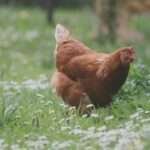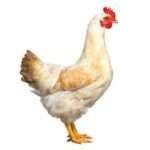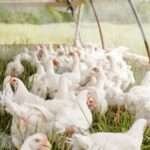As more people embrace sustainable living and backyard chicken keeping, the focus on providing natural and healthy diets for chickens has gained significant attention. Feeding chickens naturally is not only beneficial for their overall health and well-being but also contributes to the superior quality of the eggs they produce. In this comprehensive guide, we will explore the importance of a natural diet for chickens, the nutritional needs of these birds, and how to incorporate natural feeding practices into your backyard flock’s daily routine.
Understanding a Chicken’s Natural Diet:
Exploring the Diet of Wild Chickens: Before delving into the world of natural feeding, it is essential to understand the roots of a chicken’s diet. The ancestors of domestic chickens were wild birds that relied on a varied and omnivorous diet. In their natural habitat, chickens foraged for insects, worms, seeds, grains, and greens, creating a well-balanced and nutritious menu.
Analyzing the Nutritional Needs of Chickens: To ensure the health and productivity of your backyard chickens, it is crucial to meet their specific nutritional requirements. Chickens have different nutritional needs during various life stages, including chick development, egg-laying, and meat production. Understanding these needs will help you tailor their diet to suit their specific stage of life.
Identifying Natural Food Sources for Chickens: Backyard chickens can enjoy a natural diet by incorporating a wide range of food sources found in their environment. From insects and worms they find while free-ranging to kitchen scraps and garden greens, there are numerous natural options that contribute to their overall health and vitality.
The Basics of Feeding Chickens Naturally:
Free-ranging vs. Pastured Chickens: Understanding the Difference: When it comes to allowing chickens access to natural food sources, two common methods are free-ranging and pasturing. Free-ranging chickens have the freedom to roam around the yard, foraging for insects, plants, and other food items. Pastured chickens, on the other hand, are kept in enclosed areas with access to fresh grass and other vegetation. Understanding the distinction between the two approaches will help you choose the best option for your flock.
Creating a Balanced Diet Using Kitchen Scraps, Grains, and Greens: Kitchen scraps and leftovers can be a valuable addition to your chicken’s diet, providing them with a diverse range of nutrients. However, it’s essential to ensure a balanced diet by incorporating a variety of grains and greens as well. Properly managing these food sources will contribute to your chickens’ well-being and egg quality.
Introducing Insects and Worms as a Source of Protein: Insects and worms are natural protein sources that chickens adore. Whether you have access to a compost pile or use a dedicated worm farm, these critters are excellent additions to your chicken’s diet, promoting healthy growth and feather development.
The Role of Foraging and Its Impact on a Chicken’s Diet: Allowing your chickens to forage not only provides them with physical exercise but also contributes to their mental stimulation. Foraging allows chickens to exhibit natural behaviors, such as scratching and pecking, while discovering tasty treats in the process.

Natural Supplements and Treats:
Incorporating Kitchen and Garden Waste as Natural Supplements: Reduce waste and provide natural supplements for your chickens by offering kitchen and garden scraps. Fruit and vegetable peels, leftover cooked grains, and leafy greens can be nutritious additions to their diet. However, be cautious about offering certain foods that may be harmful to chickens, such as avocado peels and pits.
Offering Fruits and Vegetables to Enhance Nutrition and Health: Fruits and vegetables not only add variety to your chicken’s diet but also provide essential vitamins, minerals, and antioxidants. Consider introducing seasonal produce like watermelon in the summer and pumpkin in the fall to keep your flock engaged and nourished.
Selecting Herbs and Edible Plants for Their Medicinal Properties: Herbs and edible plants can serve as natural remedies to support your chicken’s health. Some herbs, such as oregano, thyme, and garlic, have antimicrobial properties that may help boost their immune system and overall well-being.
Limiting Treats and Maintaining a Balanced Diet: While treats can be a fun way to interact with your chickens, it’s crucial to strike a balance to prevent overindulgence. Excessive treats can lead to nutritional imbalances and negatively affect egg production. Moderation is key when offering treats to your flock.
Feeding Chickens Naturally: The Role of Grains and Seeds
Identifying Nutritious Grains and Seeds for Chickens: Grains and seeds form an essential part of a chicken’s diet. Common grains such as corn, oats, and wheat, along with seeds like sunflower and flax, provide valuable carbohydrates, fats, and proteins.
Soaking and Fermenting Grains to Enhance Digestibility: Soaking or fermenting grains can improve their digestibility and increase nutrient absorption. This process mimics the natural breakdown that occurs in a chicken’s gizzard, making the nutrients more accessible for absorption.
Understanding the Importance of Grit for Grain-Eating Chickens: For chickens that consume grains and seeds, providing grit is essential. Grit helps chickens break down and grind their food in their gizzard, aiding digestion and supporting nutrient absorption.
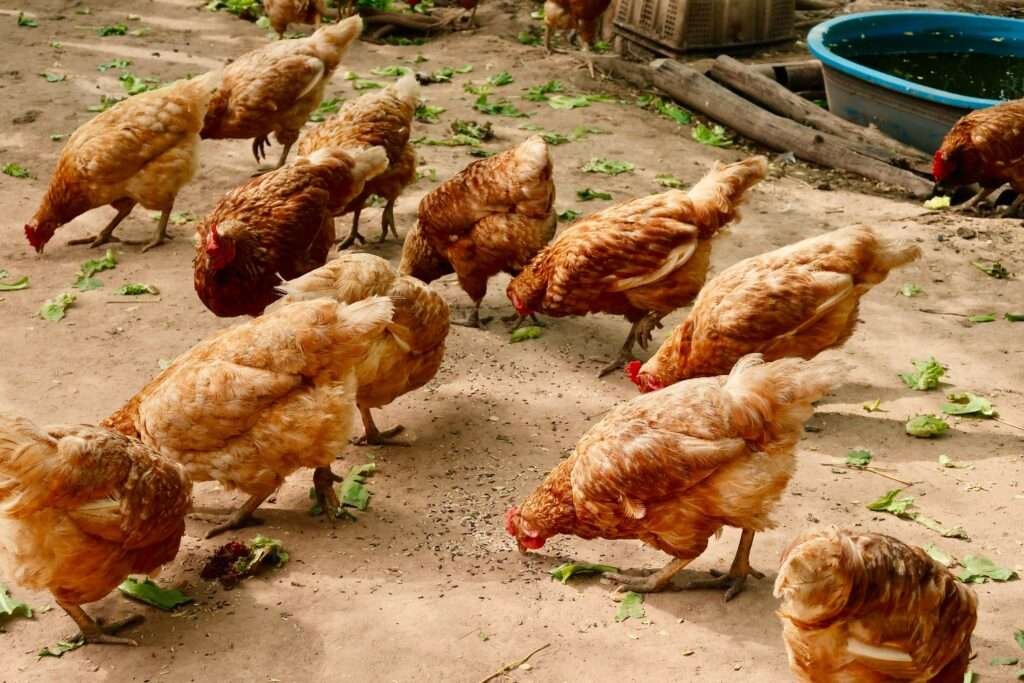
Alternative Protein Sources for Chickens:
Incorporating Alternative Protein Sources into a Chicken’s Diet: Chickens require a substantial amount of protein for proper growth, feather development, and egg production. In addition to insects and worms, consider incorporating alternative protein sources such as black soldier fly larvae or duckweed.
Using Legumes and Pulses to Supplement Protein Requirements: Legumes and pulses, such as lentils and peas, are rich in protein and can serve as excellent supplements to your chicken’s diet. Sprouting these seeds before offering them to your flock increases their nutritional value.
Considering Fish and Other Animal By-Products as Protein-Rich Treats: Occasionally, you can provide protein-rich treats like fish meal or meat scraps from reputable sources. These treats can help enhance protein intake but should be offered in moderation.
Natural Feed for Broilers and Meat Chickens:
Balancing Natural Feed for Broilers to Promote Healthy Growth: Broilers, or chickens raised for meat production, have specific dietary requirements to support their rapid growth. Create a balanced natural feed that provides adequate protein, vitamins, and minerals, ensuring your meat birds grow healthily and develop robust muscles.
Incorporating Pasture and Fresh Greens for Free-Range Meat Birds: For free-range meat chickens, allowing access to pasture and fresh greens contributes to their diet and overall well-being. This natural foraging behavior not only enhances their diet but also results in more flavorful and nutritious meat.
Enhancing Meat Quality through Natural Feeding Practices: Feeding meat chickens a natural diet can improve the quality of their meat, enhancing taste and nutritional value. The nutrients obtained from a diverse diet contribute to the development of delicious, tender, and well-textured meat.
Feeding Chickens Naturally on an Organic Diet:
Understanding Organic Certification and Its Relevance to Chicken Feed: Organic chicken feeding involves using only organic and non-GMO feed ingredients. Understand the significance of organic certification and how it benefits your chickens and the environment.
Identifying Organic Feed Options and Their Benefits: Explore various organic feed options available in the market and consider creating your organic feed blend using natural and certified organic ingredients. Organic feed can enhance the overall health of your flock and the quality of their eggs.
Overcoming Challenges and Misconceptions about Organic Chicken Feeding: While organic feeding is considered a premium option, there may be challenges such as cost and availability. Learn how to navigate these obstacles and embrace the rewards of raising organic chickens.
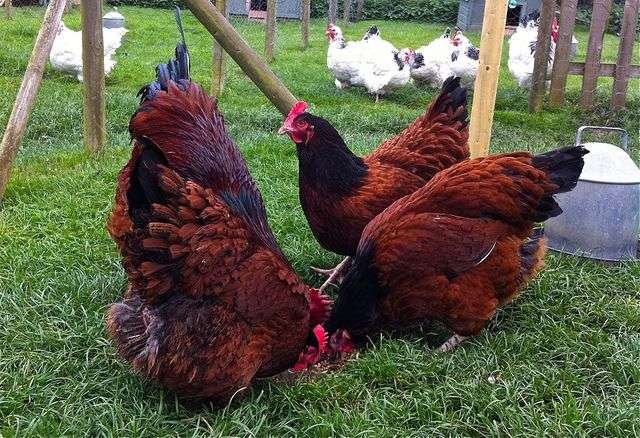
Managing Pests Naturally in the Chicken Environment:
Using Natural Methods to Control Common Chicken Pests: Incorporate natural pest control measures to protect your chickens from common pests such as mites, lice, and flies. Natural remedies like diatomaceous earth and herbal repellents can be effective and safe for your flock.
Incorporating Plants and Herbs with Pest-Repellent Properties: Certain plants and herbs have natural pest-repellent properties. Consider planting them around your coop or run to create a pest-resistant environment for your chickens.
Creating a Natural and Healthy Environment for Chickens: Maintaining a clean and well-maintained coop and run reduces the likelihood of pest infestations and promotes a healthy environment for your chickens. Regular cleaning, proper ventilation, and good sanitation practices are essential.
Assessing the Health and Productivity of Chickens on Natural Diets:
Monitoring Chicken Health and Performance on a Natural Diet: Observe your chickens’ behavior, egg-laying patterns, and overall health to gauge the effectiveness of their natural diet. Healthy chickens are more active, have glossy feathers, and lay eggs consistently.
Analyzing Egg Quality and Production in Relation to Natural Feeding Practices: A natural diet can have a positive impact on egg quality, resulting in eggs with vibrant yolks and better nutritional content. Track your flock’s egg production and assess egg quality to measure the benefits of natural feeding.
Addressing Potential Challenges and Adjusting the Diet Accordingly: Every flock is unique, and individual chickens may have varying dietary preferences and needs. Pay attention to any signs of nutritional deficiencies or imbalances and make necessary adjustments to ensure your chickens receive the best diet possible.
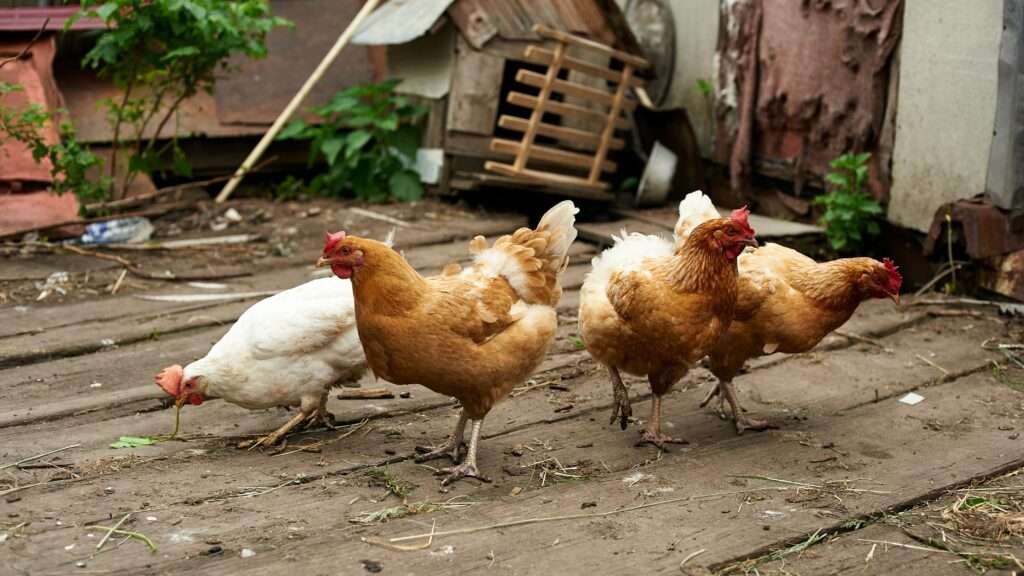
Transitioning to a Natural Diet: Tips for Success:
Gradual Transitions and Avoiding Sudden Dietary Changes: When transitioning your chickens to a natural diet, do so gradually to prevent digestive upset. Gradual changes allow their gut flora to adjust and make the transition smoother.
Introducing New Foods and Monitoring Chicken Preferences: Introduce new foods to your flock’s diet and observe their response. Chickens may take time to adjust to new foods, so be patient and encourage their acceptance.
Seeking Advice and Support from Experienced Chicken Keepers: Joining local chicken keeping communities or online forums can provide valuable insights and advice from experienced chicken keepers. Learning from others’ experiences can help you navigate the process more effectively.
Feeding Chickens Naturally
Feeding chickens naturally is a rewarding and sustainable approach that nurtures not only your flock’s health but also your connection to nature. By providing a diverse and wholesome diet, you are creating happy and contented chickens that thrive in their natural behaviors. Embrace the journey of nourishing your feathered friends with the best that nature has to offer, and enjoy the benefits of healthier and happier chickens in return. Happy and natural chicken keeping!


